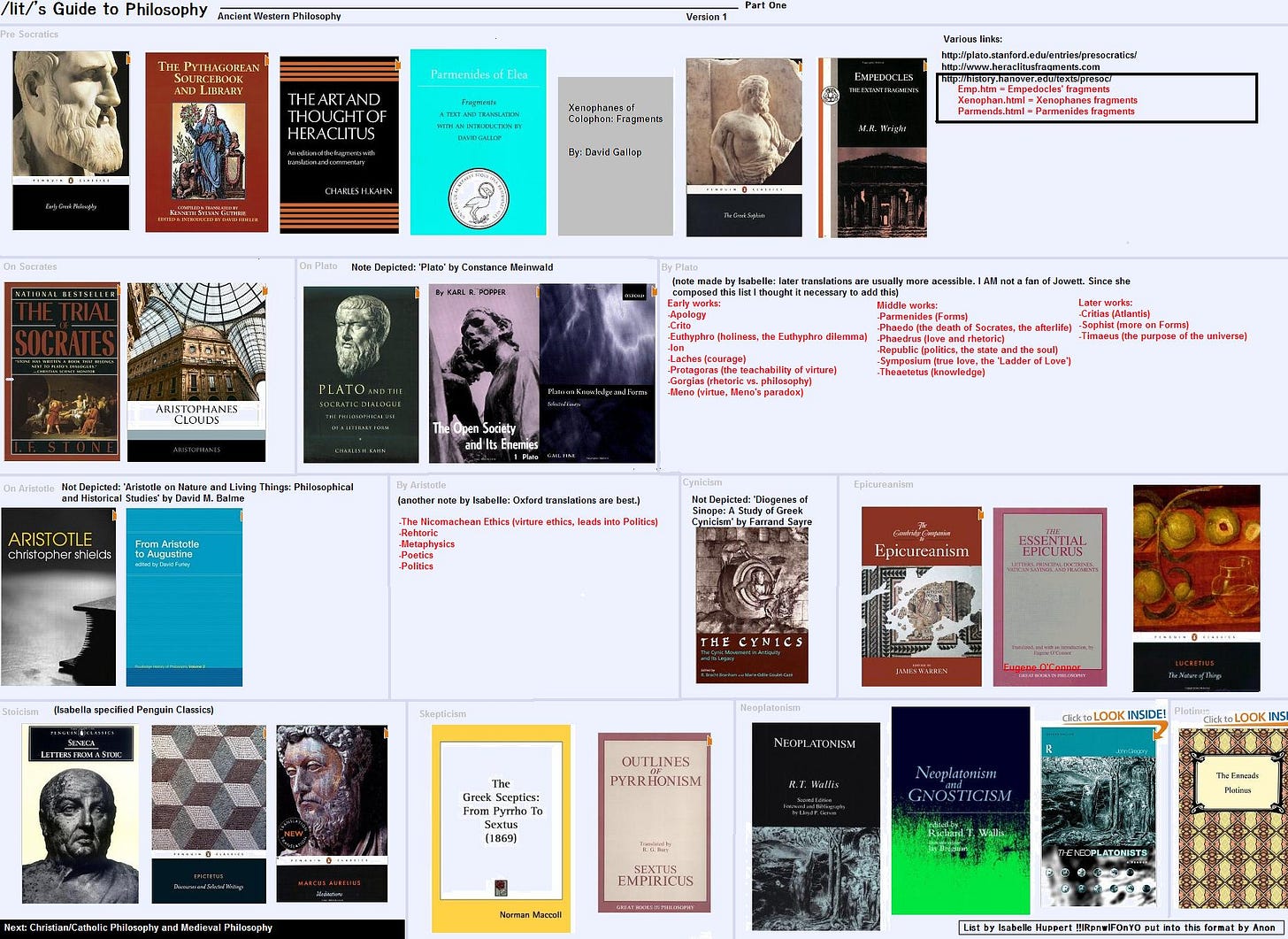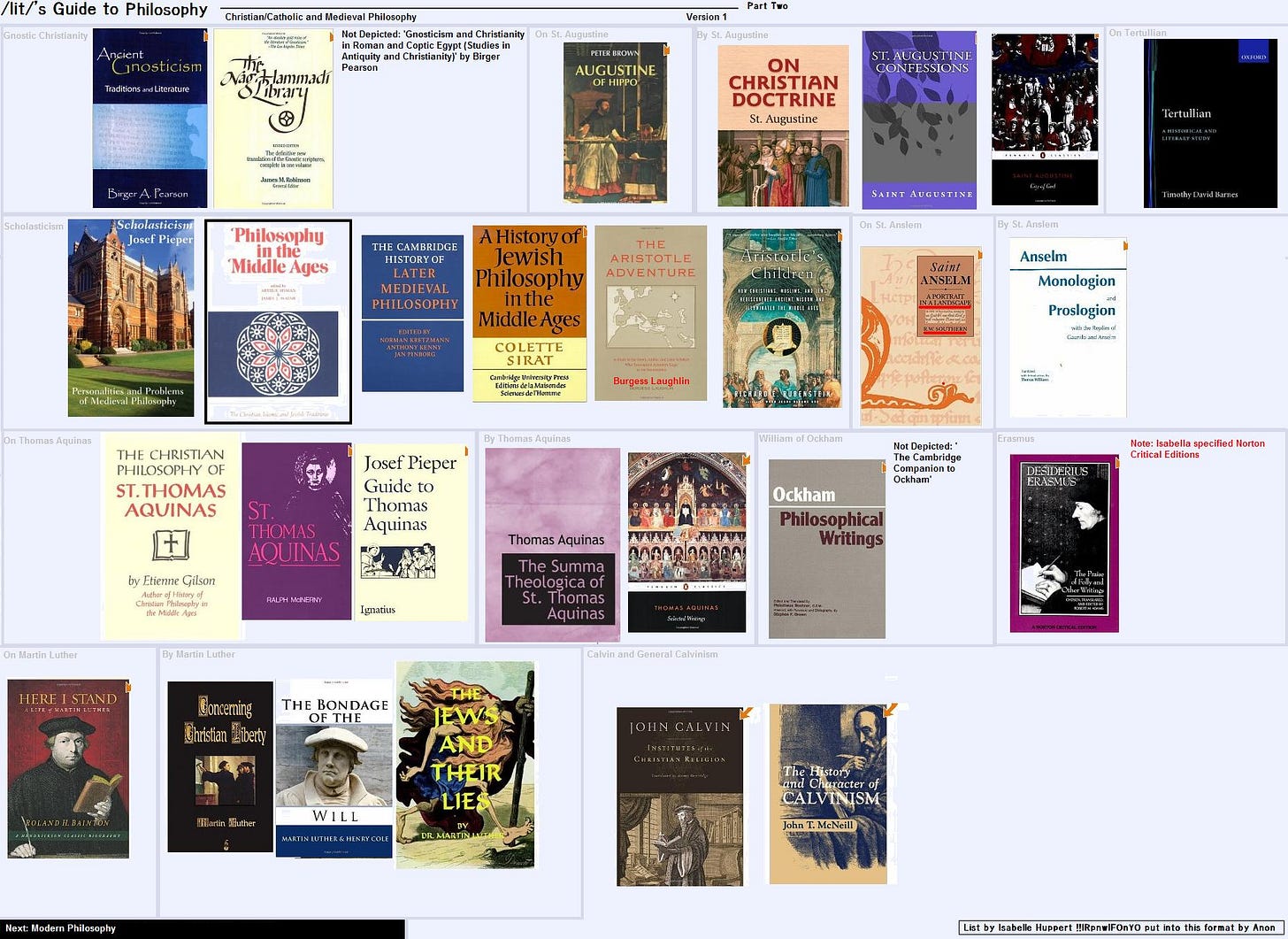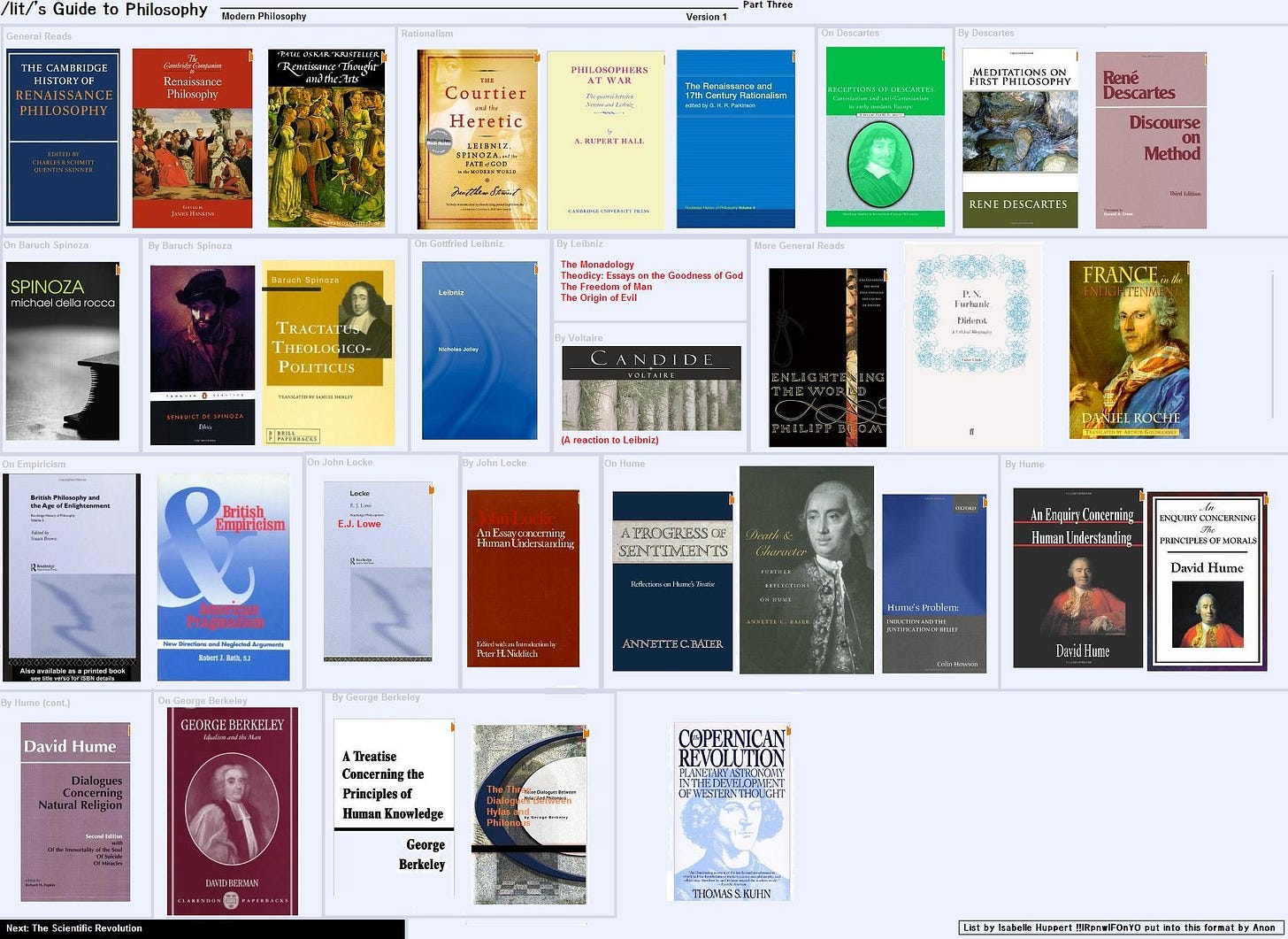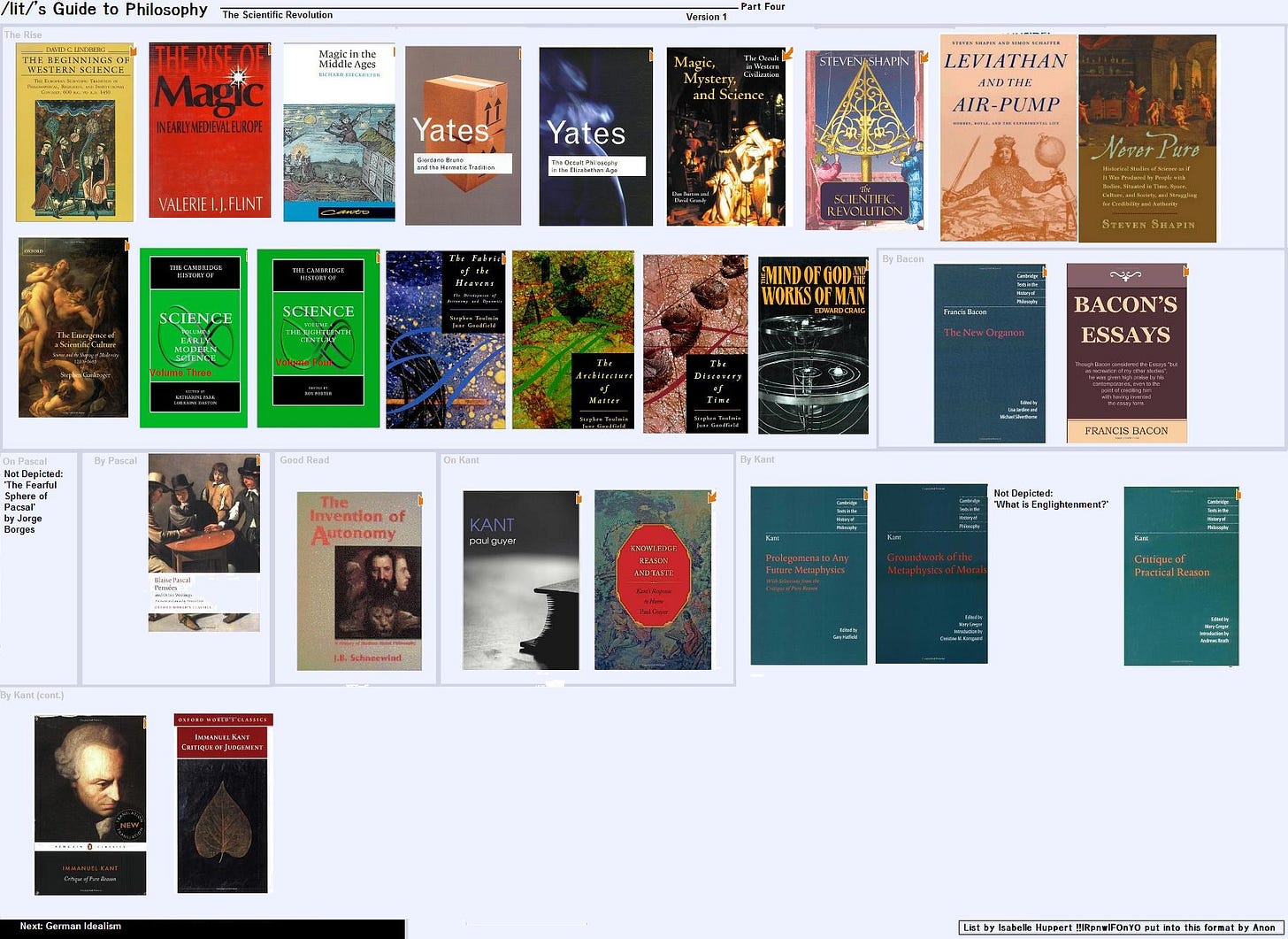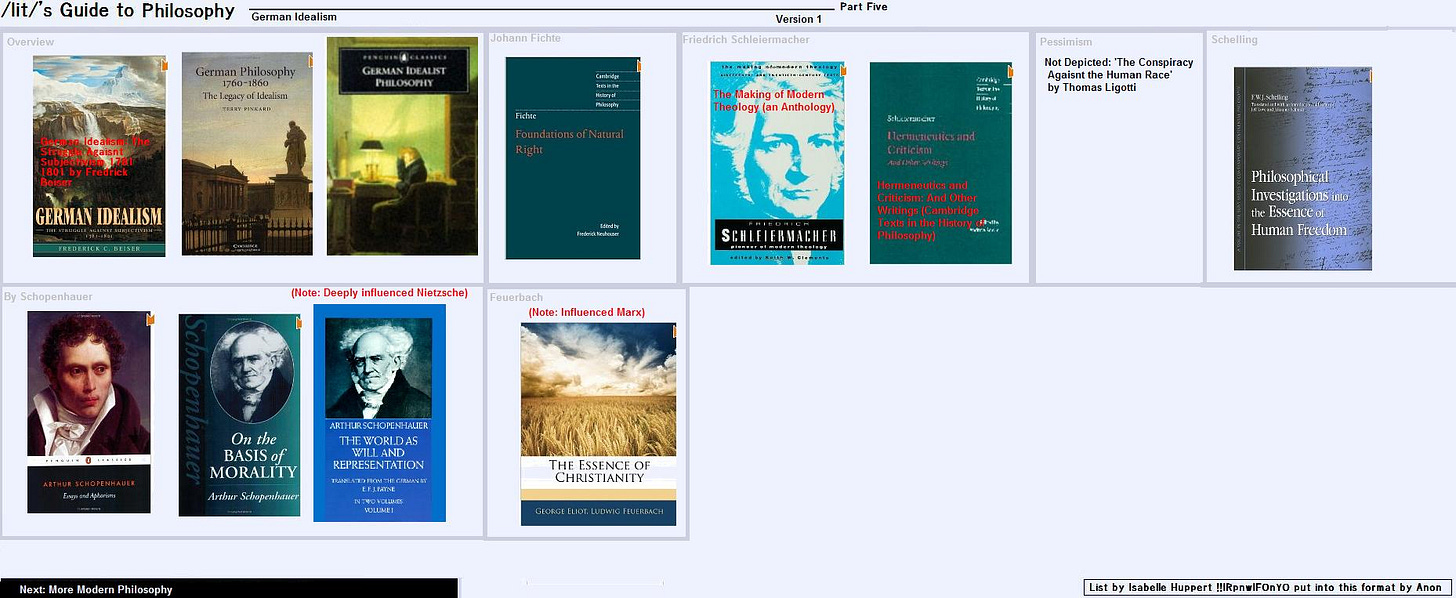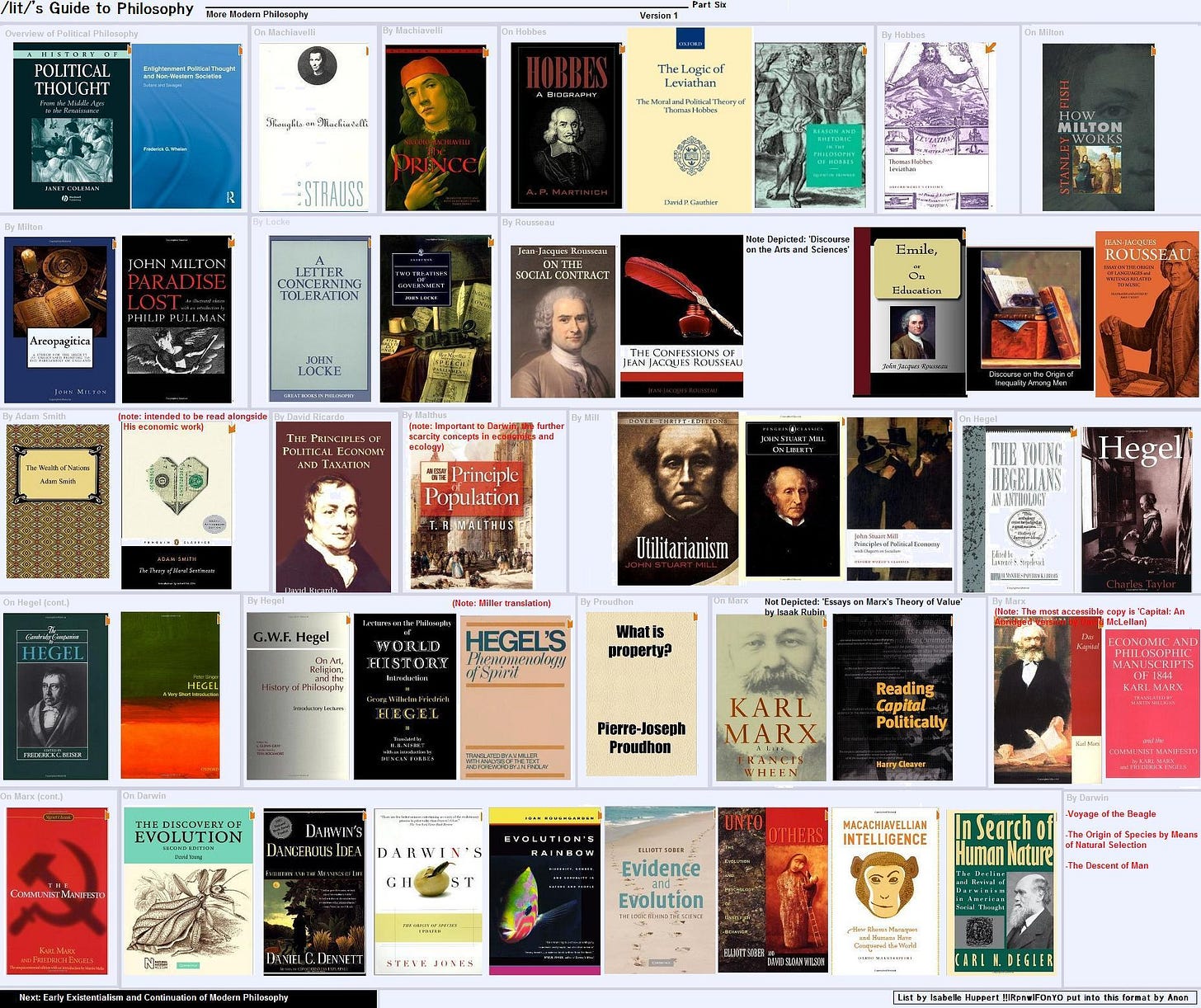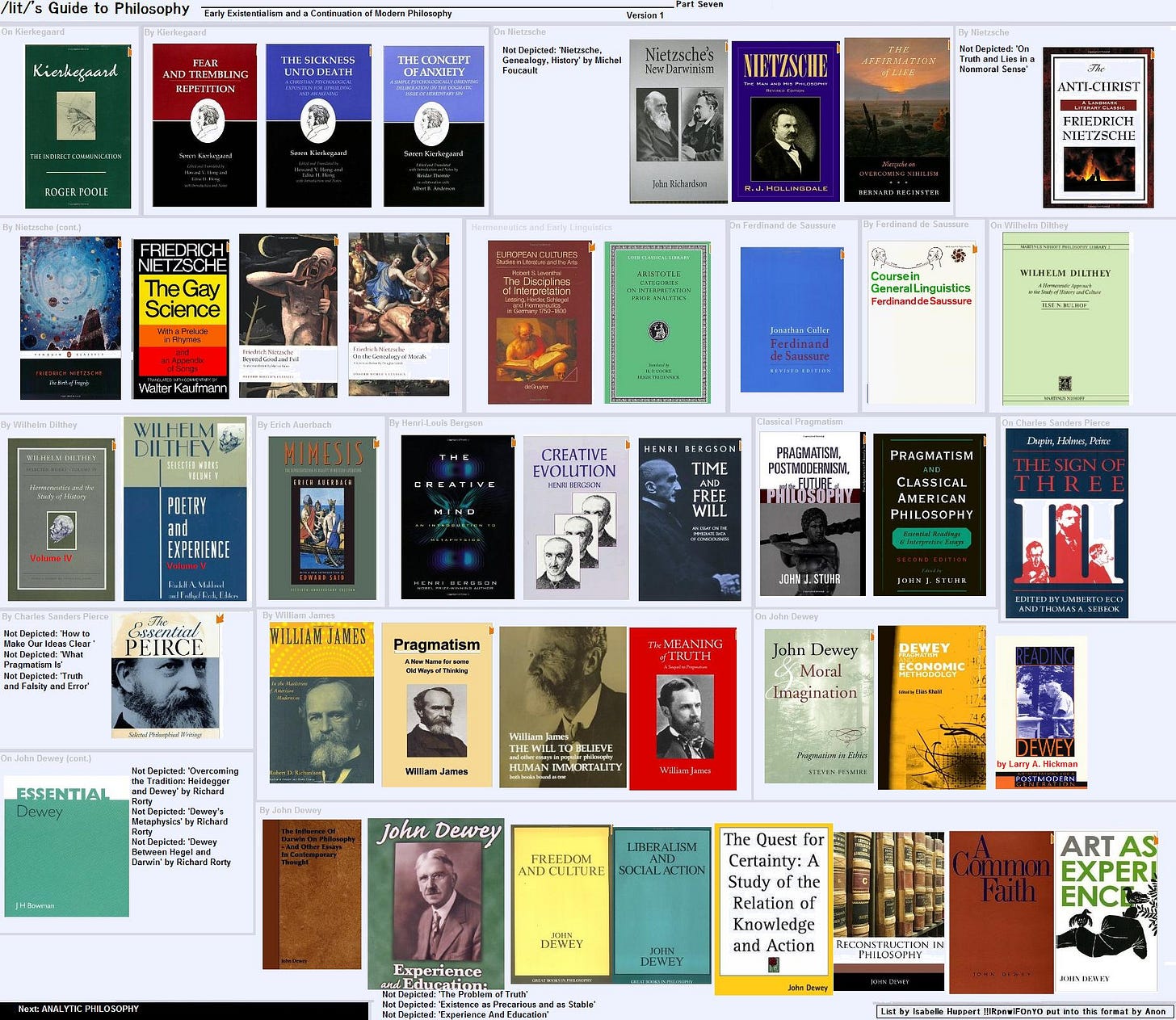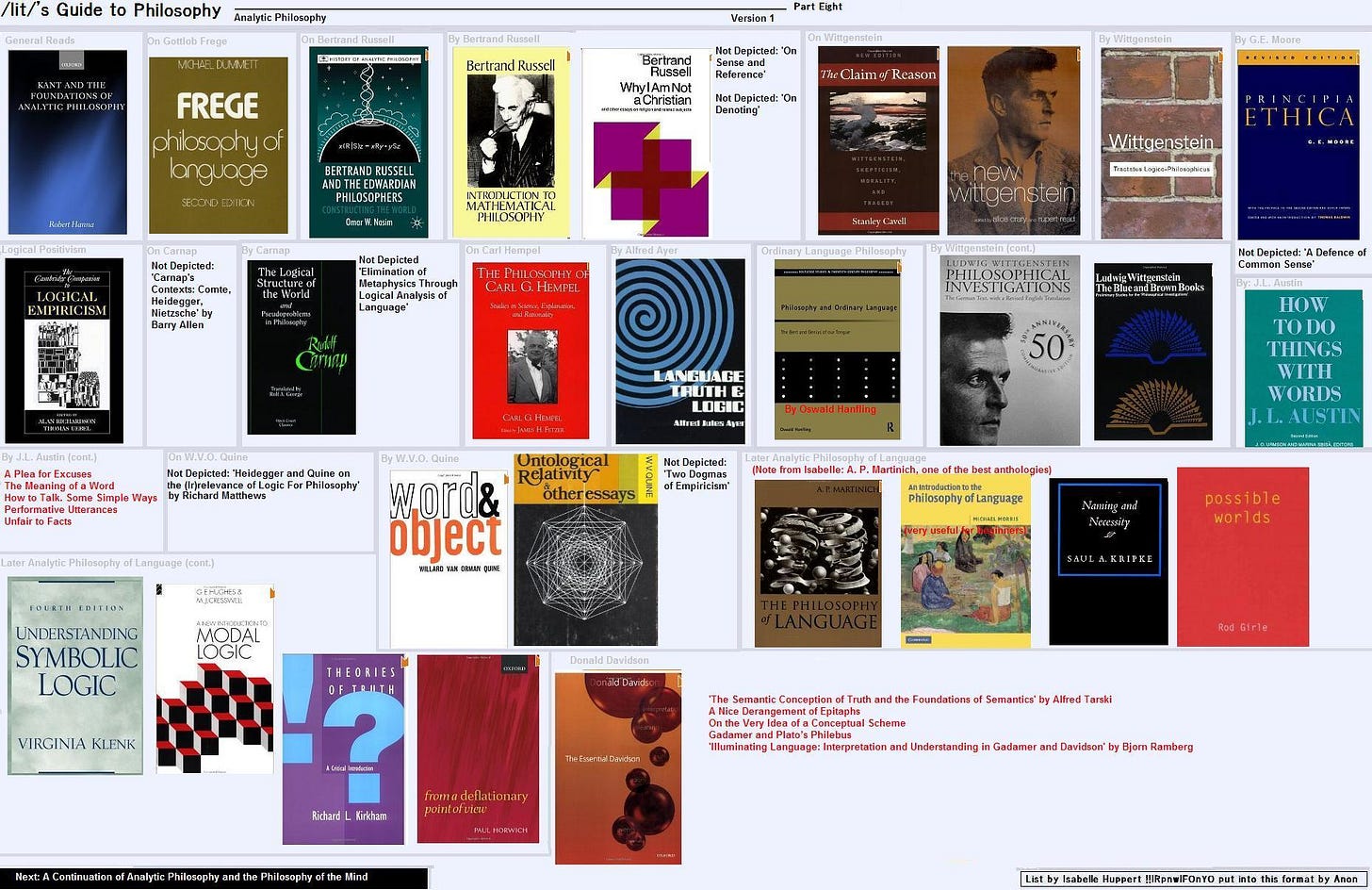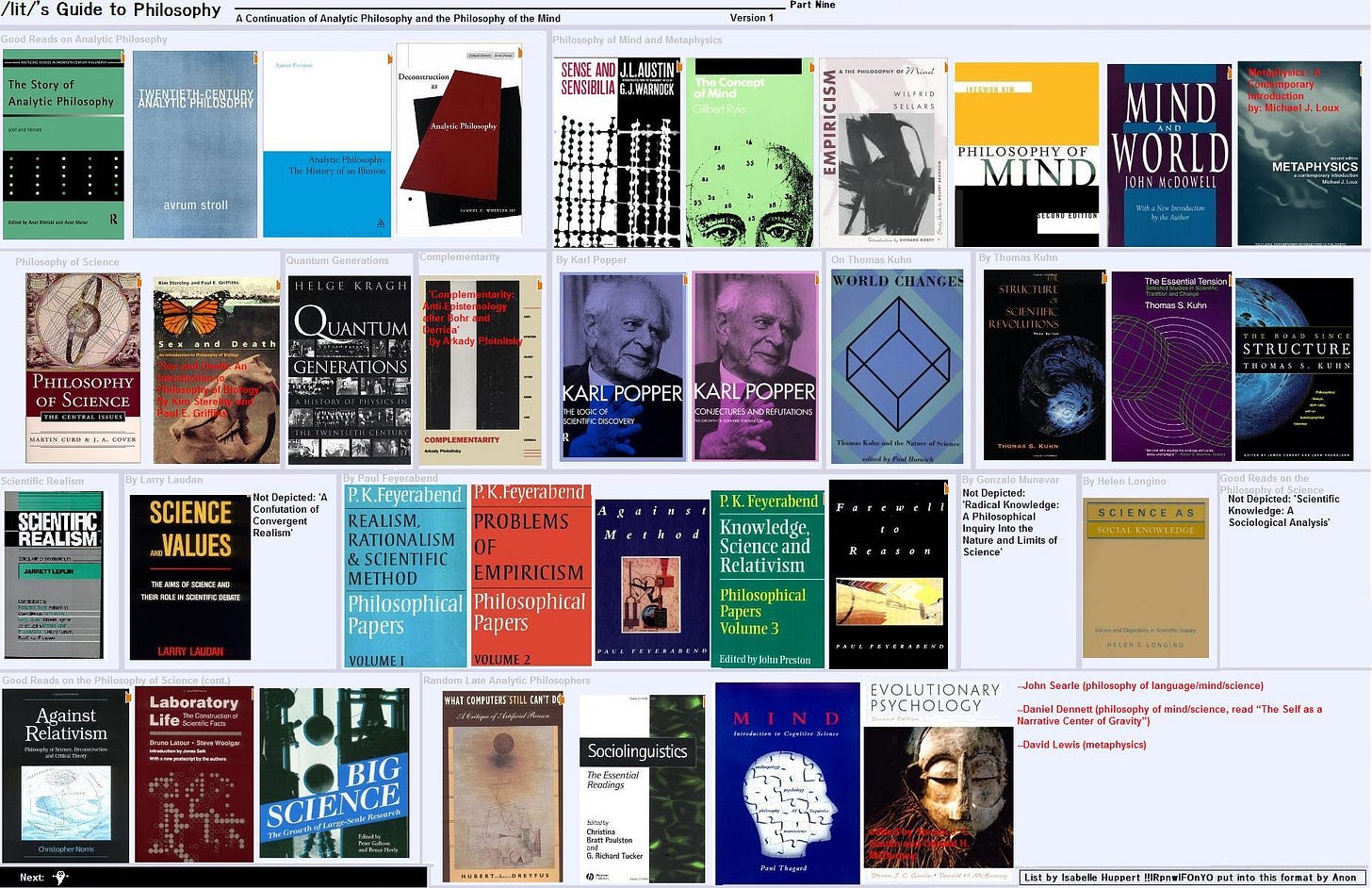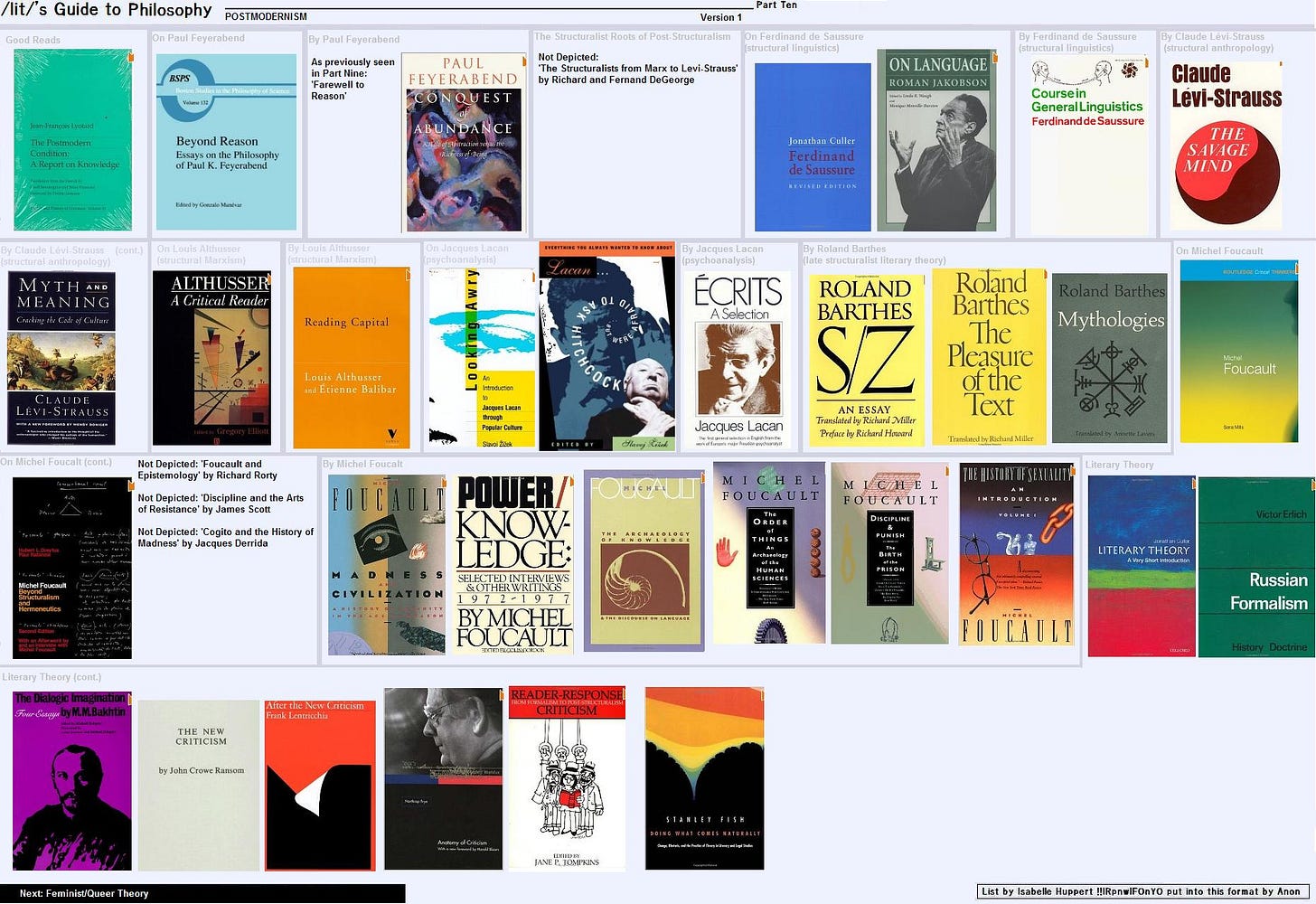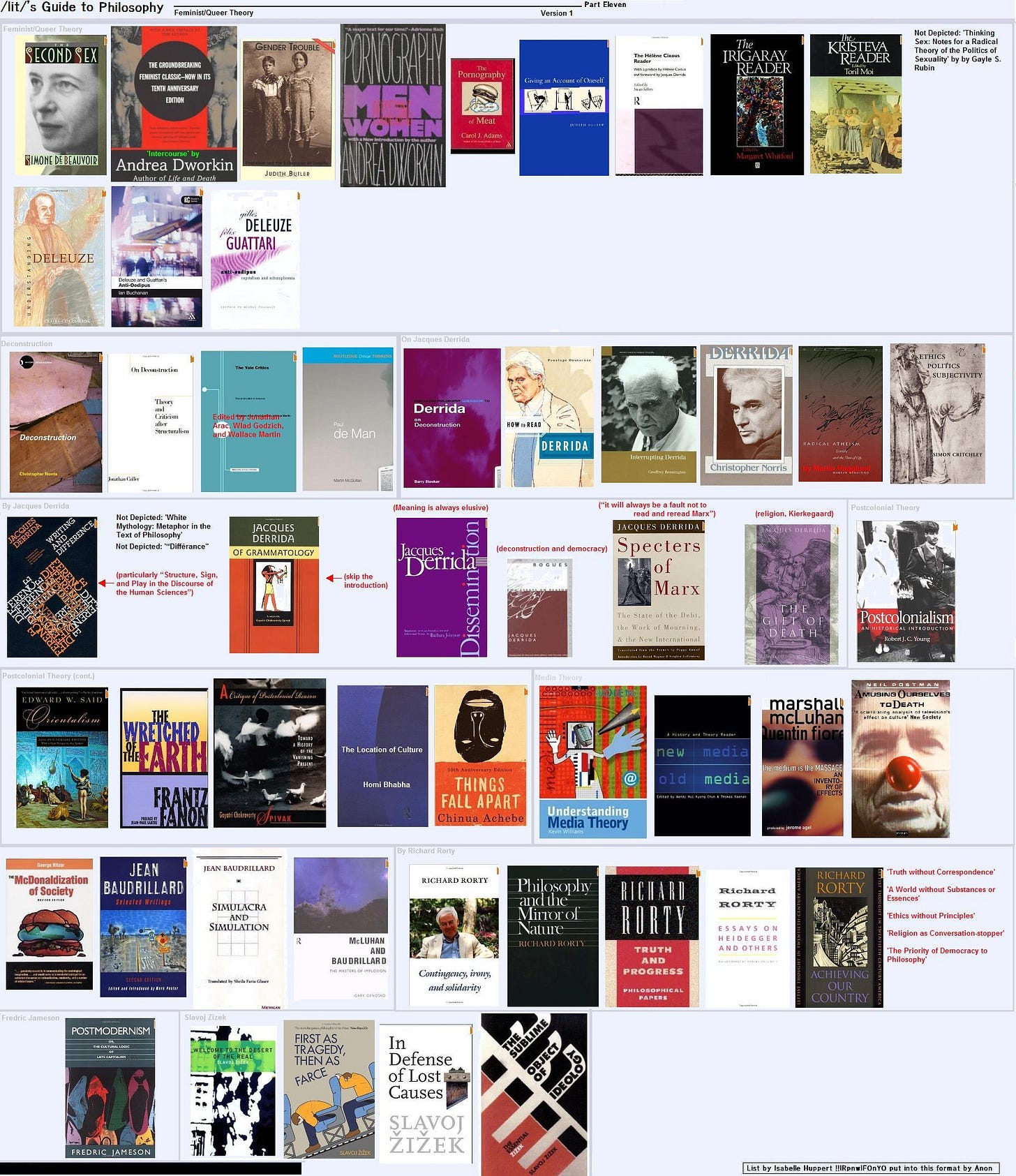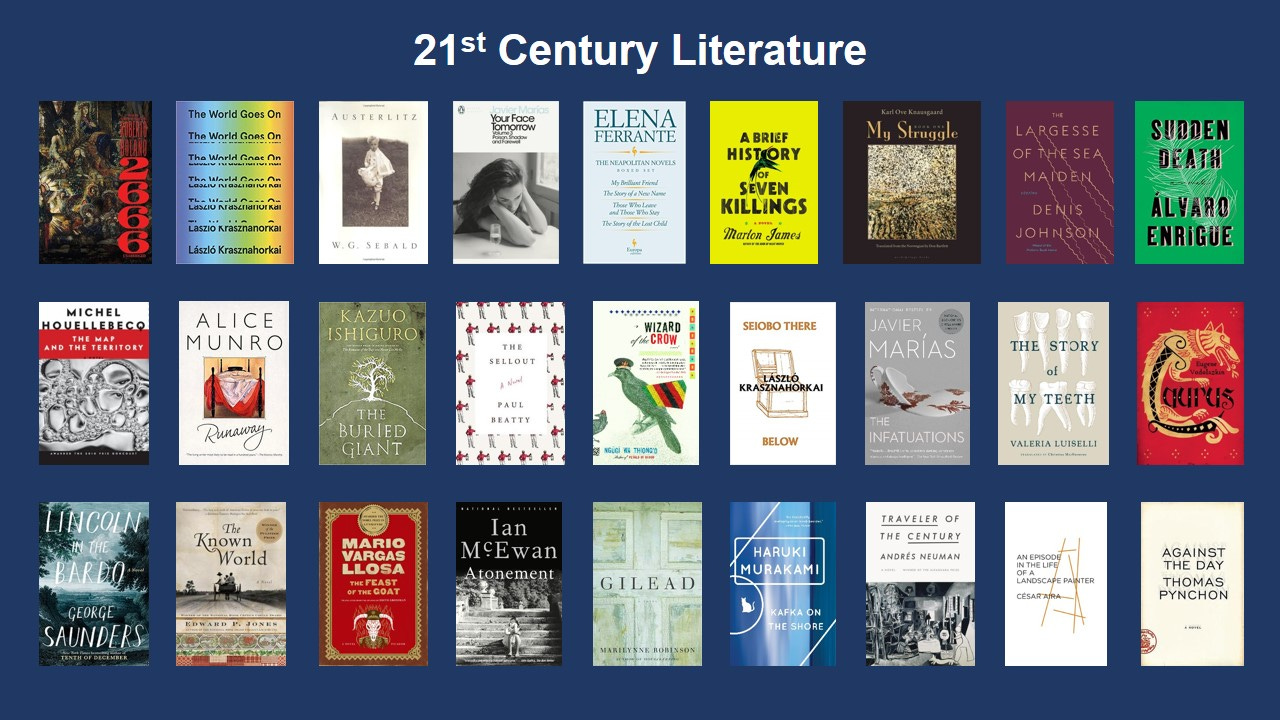If you’ve ever felt the way you spent your time wasn’t good enough, like people you knew were looking down on you for having childish, frivolous, boorish, or generally unsophisticated interests, well, I’ve often felt that way too.
The Internet, though, empowered me, starting in high school, to begin to solve these feelings of inadequacy whenever people asked about my interests and likes and dislikes, and I’d like to share some of the particular tools I’ve used to try to make my critics, real and imagined, shut up. Maybe your insecurities lie in some other area besides the ones I’ll cover, but I think from my examples you can find a general approach for finding good recommendations for whatever you need recommendations on. I was going to dump all my secrets in one long article, but it seems Substack won’t email your piece in its entirety if it’s too long, so I guess I’ll make this a multi-article series. I’ll start with how I source book recommendations, and maybe the next article will go over music.
I. Books
I remember late in eighth grade, this was in 2007, people started saying Harry Potter sucked, which made me feel bad because I liked Harry Potter; it had been my favorite series of books since I was eight and the story meant a lot to me. So if Harry Potter wasn’t good enough, what was? These are some lists that, over the years, have helped me solve this pressing question:
Time All-Time 100 Novels
Technically, it’s only English-language novels published since 1923, but this list was one of my first introductions to serious literature, you know, the kind adults read, but even the modal adult nowadays won’t get through the first chapter of The Sound and the Fury, so if you’ve been reading Harry Potter and other fantasy-type books for children up till now, saying you’re reading Faulkner is a good way to make anyone, regardless of age, shut up about your reading habits. There are some lower-brow choices too, like The Lord of the Rings; The Lion, the Witch and the Wardrobe; and Watchmen (a comic book!), so a list like this is not too intimidating if you’re a bookish adolescent trying to broaden his horizons. I’d personally judge Are You There God? It’s Me, Margaret to be a fly in the ointment, but I’m sure it’s a fine book for girls, and you can just skip it if you want: no one’s going to judge a teenaged boy for not wanting to read that particular novel.
Modern Library 100 Best Novels
There’s a lot of overlap with the Time list, but it’s strictly twentieth-century, whereas Time goes up to 2004. Because Modern Library starts at 1900, it includes three books by James Joyce, and those might be a little difficult if you’re just starting out with novels, I don’t know, I’ve only read A Portrait of the Artist as a Young Man. I would definitely say that you should probably read a little more broadly, beyond even these first two lists, before you attempt Finnegans Wake whose reputation for obscurity precedes itself. I’ll also say that since ninth grade I’ve only once abandoned a book in English for its difficulty, and that was The Ambassadors by Henry James, which I found too hard for me when I was seventeen. There’s also a Best Nonfiction list, but this one is more inconsistent. I mean, are they really expecting to read the Principia mathematica, the book where A.N. Whitehead and Bertrand Russell prove that 1 + 1 = 2? And I don’t see what Strunk and White is doing there either. So I would advise skimming the nonfiction list and seeing if anything looks interesting; no need to force yourself to read a reference book cover to cover.
Harold Bloom’s Western canon
The one we all know and love. If you’re already an adult and you’re mainly interested in imaginative literature, you can just skip the first two book lists and work through this one, which should have enough content to last a lifetime and ought to leave you having read almost any pre-1994 author worth reading that anyone will recommend to you ever. After that, if someone sees you reading Harry Potter and the Sorcerer’s Stone and tells you to read another book, you can just laugh in their face and even spit in it. Yes, I know, Bloom composed this appendix under duress and he later disavowed it, but he has the luxury of his hard-earned broad and deep knowledge of the history of literature and we don’t, so we have to pick up the crumbs as they fall. That said, you should buy a copy of Bloom’s Western Canon: The Books and School of the Ages, because the actual book has recommendations for translation and editions which this webpage does not, and some of the items might leave you scratching your head if you don’t know Bloom had specific volumes in mind. For example, António Ferreira is one of two poets to represent Portugal in the Aristocratic Age, but the webpage only says “Poetry” under his name, and almost all of Ferreira’s poetry, to my knowledge, has never been translated into English. But if you look in the book you’ll see that Bloom meant to point us to Ferreira as translated in The Muse Reborn, a collection by T.F. Earle, so there you go.
If this list is too long for you, consider using the long list as a guide to Harold Bloom’s short list, featured in the body of The Western Canon: The Books and School of the Ages, of canonical authors:
William Shakespeare
Dante Alighieri
Geoffrey Chaucer
Miguel de Cervantes
Michel de Montaigne
Molière
John Milton
Samuel Johnson
Johann Wolfgang von Goethe
William Wordsworth
Jane Austen
Emily Dickinson
Charles Dickens
George Eliot
Leo Tolstoy
Henrik Ibsen
Sigmund Freud (not contained in the long list)
Marcel Proust
James Joyce
Virginia Woolf
Franz Kafka
Jorge Luis Borges
Pablo Neruda
Fernando Pessoa
Samuel Beckett
You can look up what works by each of these authors, with the exception of Freud, are recommended in the long list linked above, and thereby hit the highlights.
Philosophy recommendation charts by 4chan tripfag Isabelle Huppert !!IRpnwIFOnYO
I used to take a dim view of philosophy; I used to imagine John Locke or some eighteenth-century intellectual saying that we should respect individual rights, without going too far to undermine the common welfare, and that this vague, wishy-washy musing was about the long and short of what philosophers did. What changed my mind was when in tenth grade a guy in my debate class showed me a short one-page case written by an older student on the resolution we were arguing that term, about the justice of vigilantism; unlike a traditional Lincoln-Douglas debate case, it didn’t invoke a value or a value criterion, and my classmate told me, to my amazement, that the older student used it to argue both for the affirmative and the negative. All I remember about the case was that there was some language about “rights claims” and “fleeing to the sovereign,” and that it cited someone named “Foucault.” I didn’t really understand the case or how it could be used to either affirm or negate the resolution, but I knew then that there was something important going on in philosophy that I didn’t get. About a year later, I started browsing 4chan’s /lit/ board and saw people talking about philosophers and using terms of art like “structure,” “normative,” and “metaphysics,” and talking about the genealogies of different belief systems; they sounded so smart, and I wanted to be like them. I can’t remember how exactly, but one day I came into the possession of these recommendation charts based on a philosophy reading list put together by a tripfag (a non-anonymous user who identifies themselves using a handle and a hashcode) named “Isabelle Huppert !!IRpnwIFOnYO,” whom I understood to be some kind of professional philosopher with a Ph.D. and everything, and I saw these charts as the key to acquiring the mastery of philosophy I envied. Here are the charts, containing Isabelle Huppert’s recommendations, as they have come down to me:
One thing to note about 4chan recommendation charts is that they sometimes include troll recommendations, that is, recommendations that are bad on purpose. You sort of have to be hip on the culture of the board that produced the chart to sniff these out; often the troll recommendations are memes of some kind. It’s possible, though I don’t know for sure, that The Jews and Their Lies by Martin Luther, on the “Christian/Catholic and Medieval Philosophy” chart, is a troll. Anti-Semitism is definitely a running gag throughout 4chan, including on the /lit/ board where these charts originated. I have read this treatise by Luther, and while there is a lot of anti-Semitic venom, it also features an interesting discussion on the disagreement, downplayed nowadays in the post-Holocaust climate of reconciliation between Christianity and Judaism, over how these religions interpret the Hebrew prophets, particularly the passages that seem to promise a messiah. So The Jews and Their Lies is of some philosophical interest, though I don’t think it’s exactly a major Lutheran work, so maybe it is a troll.
Non-classic literature
The Harold Bloom list should be plenty, but if you’re looking for literature that’s a little more contemporary and you’ve already finished the Time list, the first place I would look if I were you is the Nobel Prize in Literature; these are more lifetime-achievement awards, and I’m not saying they get it right everytime, but usually the Nobel laureates are strong authors, and they have to be alive when they receive their prizes, and the Nobel Prize is certainly a better literary award than the National Book Award or the Man Booker Prize, which are too populist and conservative. Or hey, here’s another chart from /lit/:
I can personally vouch for 2666; it’s excellent. I didn’t care too much for The Sellout, whose satire, the whole premise of resegregating schools, doesn’t seem as novel or edgy in 2025 as it might have done in 2014. But it’s OK if you don’t like one critically acclaimed novel, right? We’re not on a pleasure cruise here.
Another trick you can try is feeding a large language model like ChatGPT Harold Bloom’s Western canon and asking it to name authors, or particular works, that, based on that list, Harold Bloom would likely add to his canon if he were alive today. You can even run it as a Deep Research prompt.




